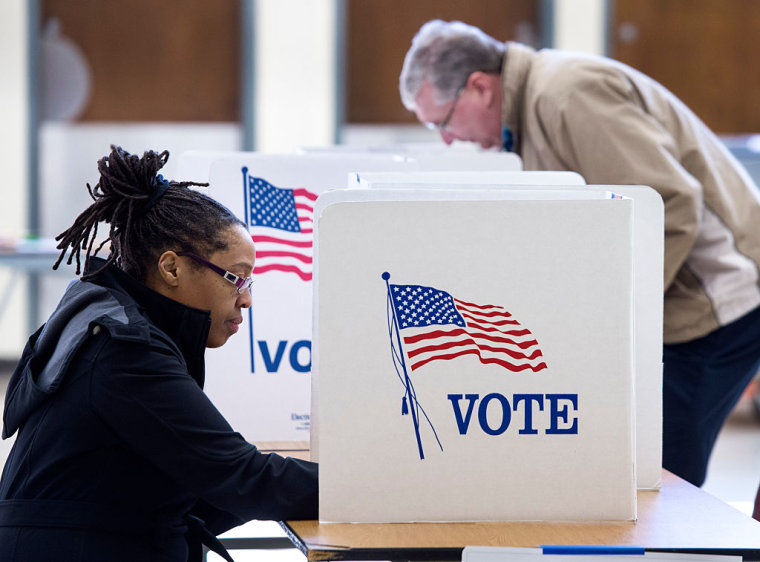High-ranking congressional Democrats are raising more serious concerns about a move by the director of a federal voting agency that made it easier for several red states to require documentary proof of citizenship from people registering to vote.
Rep. Elijah E. Cummings, Rep. Robert A. Brady and Rep. James E. Clyburn urged the Election Assistance Commission in a letter sent Wednesday to formally rescind a change made in January to the instructions on the federal voter registration form for Kansas, Georgia and Alabama, which allowed those states to require citizenship proof.
Related: Voter Registration Emerges as Key Political Flash-Point
A federal court found this month that the move, which was carried out unilaterally by the agency's executive director, Brian Newby, could disenfranchise large numbers of eligible voters. Ruling that the move may violate federal voting law, the court blocked it from being enforced pending a resolution of the case.
The letter outlines what the lawmakers called “troubling findings” from their probe into the issue — among them, that Newby conducted no written analysis of the impact of the change, and that he himself may no longer be certain that it was legal.
“We remain extremely concerned that Mr. Newby’s actions violated internal EAC policies and precedent and may already have impaired the legitimate right to vote of many Americans,” the lawmakers wrote.
Cummings is the top Democrat on the House Committee on Oversight and Government Reform, Brady is the top Democrat on the Committee on House Administration, and Clyburn is the Assistant Democratic Leader, the number three position in the House Democratic caucus.
Asked for comment, a spokesman for the EAC told NBC News that the agency would review the lawmakers' request, and would respond directly to them. Newby has defended the move in the past, describing it to MSNBC as a routine administrative change which he was authorized to do without the approval of the agency’s commissioners.
Related: Court Rejects Ohio's System for Removing Voters from Rolls
Kansas, Alabama, Georgia, and Arizona all have passed laws requiring voter registration applicants to provide proof of citizenship, but only Kansas is enforcing its law. At least 30,000 Kansas applicants had been denied registration as of April thanks to the proof of citizenship requirement, though only a fraction used the federal voter registration form.
Newby acted after holding private conversations with Kansas Secretary of State Kris Kobach, a prominent backer of restrictive voting laws, Newby has said. Kobach reappointed Newby to his position as a county election administrator in Kansas before Newby took the EAC job, and the two have publicly praised each other.
Under Newby's predecessor, the EAC had twice denied the states' requests to change the form.
Related: Voter Registration Flap Still Haunting Election Agency
In their letter, the Democrats lay out the following findings from the investigation they conducted into Newby’s move:
— They say Newby conducted no written analysis or cost-benefit analysis of the move, to ensure that it would result in more ineligible voters being blocked than eligible ones.
— They say that between them, Kansas, Alabama and Georgia offered just one ineligible voter to support their claim that the change was necessary to protect against illegal voting. (Arizona did not seek to have the form changed).
— They say Newby told investigators in an August hearing that he had been unaware until recently that proof of citizenship laws disproportionately impact minority voters — though there’s mountains of evidence to support that conclusion.
— They say Newby told investigators that he was aware that the EAC had twice denied the states’ requests to change the form, but that he “needed to have a point of view” and did not want to “rubber stamp” past precedent.
— They say Newby told investigators that he believed the move to be legal when he carried it out, but that he’s no longer sure.
— They note that on his personal blog, Newby wrote in 2012: “No election administrator has been more in favor of closing the EAC than me.” The letter then notes that he wrote in 2014, “[T]he EAC is now a ‘was,’” thought it does notnote that Newby added, "There are a lot of good people doing good work at the EAC." The following year, he would accept a job as the agency’s executive director. The posts, the lawmakers appear to suggest, potentially raise questions about Newby’s commitment to running an effective and independent agency.
The EAC is supposed to have two commissioners from either party, but it currently has two Republican commissioners and only one Democrat. The commissioners have neither approved nor reversed Newby’s move.
